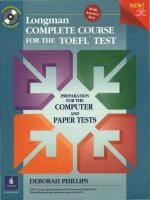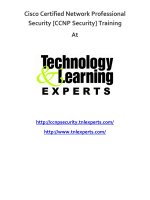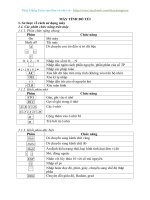Sybex CCNP complete study guide may 2005 ebook DDU kho tài liệu bách khoa
Bạn đang xem bản rút gọn của tài liệu. Xem và tải ngay bản đầy đủ của tài liệu tại đây (25.86 MB, 1,422 trang )
CCNP®
Complete Study Guide
Wade Edwards, et al.
SYBEX®
CCNP®
Complete
Study Guide
Wade Edwards, CCIE, Terry Jack, CCIE,
Todd Lammle, CCNP, Robert Padjen, CCNP,
Arthur Pfund, CCIE, Toby Skandier, CCNP,
Carl Timm, CCIE
San Francisco • London
Associate Publisher: Neil Edde
Acquisitions and Developmental Editor: Maureen Adams
Production Editor: Mae Lum
Technical Editor: Craig Vazquez
Copyeditor: Sarah Lemaire
Compositor: Craig J. Woods, Happenstance Type-O-Rama
Graphic Illustrator: Happenstance Type-O-Rama
CD Coordinator: Dan Mummert
CD Technician: Kevin Ly
Proofreaders: Jim Brook, Candace English, Jennifer Larsen, Nancy Riddiough
Indexer: Nancy Guenther
Book Designers: Bill Gibson, Judy Fung
Cover Designer: Archer Design
Cover Illustrator/Photographer: Photodisc and Victor Arre
Copyright © 2005 SYBEX Inc., 1151 Marina Village Parkway, Alameda, CA 94501. World rights reserved. No
part of this publication may be stored in a retrieval system, transmitted, or reproduced in any way, including but
not limited to photocopy, photograph, magnetic, or other record, without the prior agreement and written permission of the publisher.
Portions of this book were published under the titles:
CCNP: Building Scalable Cisco Internetworks Study Guide © 2004 SYBEX Inc., CCNP: Building Cisco Multilayer
Switched Networks Study Guide © 2004 SYBEX Inc., CCNP: Building Cisco Remote Access Networks Study
Guide © 2004 SYBEX Inc., and CCNP: Cisco Internetwork Troubleshooting Study Guide © 2004 SYBEX Inc.
Library of Congress Card Number: 2005920775
ISBN: 0-7821-4421-7
SYBEX and the SYBEX logo are either registered trademarks or trademarks of SYBEX Inc. in the United States
and/or other countries.
Screen reproductions produced with FullShot 99. FullShot 99 © 1991-1999 Inbit Incorporated. All rights reserved.
FullShot is a trademark of Inbit Incorporated.
The CD interface was created using Macromedia Director, COPYRIGHT 1994, 1997-1999 Macromedia Inc. For
more information on Macromedia and Macromedia Director, visit .
This study guide and/or material is not sponsored by, endorsed by or affiliated with Cisco Systems, Inc. Cisco®,
Cisco Systems®, CCDA™, CCNA™, CCDP™, CCSP™, CCIP™, BSCI™, CCNP™, CCIE™, CCSI™, the Cisco
Systems logo and the CCIE logo are trademarks or registered trademarks of Cisco Systems, Inc. in the United
States and certain other countries. All other trademarks are trademarks of their respective owners.
TRADEMARKS: SYBEX has attempted throughout this book to distinguish proprietary trademarks from
descriptive terms by following the capitalization style used by the manufacturer.
The author and publisher have made their best efforts to prepare this book, and the content is based upon final
release software whenever possible. Portions of the manuscript may be based upon pre-release versions supplied
by software manufacturer(s). The author and the publisher make no representation or warranties of any kind
with regard to the completeness or accuracy of the contents herein and accept no liability of any kind including
but not limited to performance, merchantability, fitness for any particular purpose, or any losses or damages of
any kind caused or alleged to be caused directly or indirectly from this book.
Manufactured in the United States of America
10 9 8 7 6 5 4 3 2 1
To Our Valued Readers:
Thank you for looking to Sybex for your CCNP exam prep needs. Cisco developed the CCNP
certification to validate expertise in implementing and managing Cisco internetworking solutions, and it is currently one of the most highly sought after IT certifications. Just as Cisco is
committed to establishing measurable standards for certifying those professionals who work
in the field of internetworking, Sybex is committed to providing those professionals with the
information they need to excel.
We at Sybex are proud of our reputation for providing certification candidates with the practical
knowledge and skills needed to succeed in the highly competitive IT marketplace. This four-in-one
CCNP Complete Study Guide reflects our commitment to provide CCNP candidates with the
most up-to-date, accurate, and economical instructional material on the market.
The authors and the editors have worked hard to ensure that the book you hold in your
hands is comprehensive, in-depth, and pedagogically sound. We’re confident that this book
will exceed the demanding standards of the certification marketplace and help you, the
CCNP certification candidate, succeed in your endeavors.
As always, your feedback is important to us. If you believe you’ve identified an error in the
book, please send a detailed e-mail to And if you have general comments
or suggestions, feel free to drop me a line directly at At Sybex, we’re continually striving to meet the needs of individuals preparing for certification exams.
Good luck in pursuit of your CCNP certification!
Neil Edde
Publisher—Certification
Sybex, Inc.
Software License Agreement: Terms and Conditions
The media and/or any online materials accompanying
this book that are available now or in the future contain
programs and/or text files (the “Software”) to be used in
connection with the book. SYBEX hereby grants to you
a license to use the Software, subject to the terms that
follow. Your purchase, acceptance, or use of the Software will constitute your acceptance of such terms.
The Software compilation is the property of SYBEX
unless otherwise indicated and is protected by copyright
to SYBEX or other copyright owner(s) as indicated in
the media files (the “Owner(s)”). You are hereby
granted a single-user license to use the Software for your
personal, noncommercial use only. You may not reproduce, sell, distribute, publish, circulate, or commercially
exploit the Software, or any portion thereof, without the
written consent of SYBEX and the specific copyright
owner(s) of any component software included on this
media.
In the event that the Software or components include
specific license requirements or end-user agreements,
statements of condition, disclaimers, limitations or warranties (“End-User License”), those End-User Licenses
supersede the terms and conditions herein as to that particular Software component. Your purchase, acceptance, or use of the Software will constitute your
acceptance of such End-User Licenses.
By purchase, use or acceptance of the Software you further agree to comply with all export laws and regulations of the United States as such laws and regulations
may exist from time to time.
Software Support
Components of the supplemental Software and any
offers associated with them may be supported by the
specific Owner(s) of that material, but they are not supported by SYBEX. Information regarding any available
support may be obtained from the Owner(s) using the
information provided in the appropriate read.me files or
listed elsewhere on the media.
Should the manufacturer(s) or other Owner(s) cease to
offer support or decline to honor any offer, SYBEX
bears no responsibility. This notice concerning support
for the Software is provided for your information only.
SYBEX is not the agent or principal of the Owner(s),
and SYBEX is in no way responsible for providing any
support for the Software, nor is it liable or responsible
for any support provided, or not provided, by the
Owner(s).
Warranty
SYBEX warrants the enclosed media to be free of physical defects for a period of ninety (90) days after purchase. The Software is not available from SYBEX in any
other form or media than that enclosed herein or posted
to www.sybex.com. If you discover a defect in the media
during this warranty period, you may obtain a replacement of identical format at no charge by sending the
defective media, postage prepaid, with proof of purchase to:
SYBEX Inc.
Product Support Department
1151 Marina Village Parkway
Alameda, CA 94501
Web:
After the 90-day period, you can obtain replacement
media of identical format by sending us the defective
disk, proof of purchase, and a check or money order for
$10, payable to SYBEX.
Disclaimer
SYBEX makes no warranty or representation, either
expressed or implied, with respect to the Software or its
contents, quality, performance, merchantability, or fitness for a particular purpose. In no event will SYBEX,
its distributors, or dealers be liable to you or any other
party for direct, indirect, special, incidental, consequential, or other damages arising out of the use of or inability to use the Software or its contents even if advised of
the possibility of such damage. In the event that the Software includes an online update feature, SYBEX further
disclaims any obligation to provide this feature for any
specific duration other than the initial posting.
The exclusion of implied warranties is not permitted by
some states. Therefore, the above exclusion may not
apply to you. This warranty provides you with specific
legal rights; there may be other rights that you may have
that vary from state to state. The pricing of the book
with the Software by SYBEX reflects the allocation of
risk and limitations on liability contained in this agreement of Terms and Conditions.
Shareware Distribution
This Software may contain various programs that are
distributed as shareware. Copyright laws apply to both
shareware and ordinary commercial software, and the
copyright Owner(s) retains all rights. If you try a shareware program and continue using it, you are expected to
register it. Individual programs differ on details of trial
periods, registration, and payment. Please observe the
requirements stated in appropriate files.
Copy Protection
The Software in whole or in part may or may not be
copy-protected or encrypted. However, in all cases,
reselling or redistributing these files without authorization is expressly forbidden except as specifically provided for by the Owner(s) therein.
Acknowledgments
We would like to thank Neil Edde and Maureen Adams for giving us the opportunity to
update this Study Guide. We would also like to take a moment to thank everyone else involved
in the creation of this book, including Production Editor Mae Lum; Technical Editor Craig
Vazquez; Copyeditor Sarah Lemaire; Proofreaders Jim Brook, Candace English, Jennifer
Larsen, and Nancy Riddiough; Indexer Nancy Guenther; and Dan Mummert and Kevin Ly
of the CD group.
Contents at a Glance
Introduction
xxix
Part I
Building Scalable Cisco Internetworks (BSCI)
1
Chapter 1
Routing Principles
3
Chapter 2
IP Addressing
37
Chapter 3
Network Address Translation
75
Chapter 4
IGRP and EIGRP
99
Chapter 5
OSPF Operation in a Single Area
141
Chapter 6
Interconnecting OSPF Areas
175
Chapter 7
Integrated IS-IS
205
Chapter 8
Border Gateway Protocol
235
Chapter 9
Advanced Border Gateway Protocol
283
Chapter 10
Route Optimization
323
Chapter 11
Design Considerations
357
Part II
Building Cisco Multilayer Switched
Networks (BCMSN)
377
Chapter 12
The Campus Network
379
Chapter 13
Connecting the Switch Block
413
Chapter 14
VLANs, Trunks, and VTP
445
Chapter 15
Layer 2 Switching and the Spanning Tree Protocol (STP)
481
Chapter 16
Using Spanning Tree with VLANs
501
Chapter 17
Inter-VLAN Routing
537
Chapter 18
Multilayer Switching (MLS)
553
Chapter 19
Understanding and Configuring Multicast Operation
585
Chapter 20
Quality of Service (QoS)
637
Chapter 21
Catalyst Switch Technologies
677
Contents at a Glance
Part III
Building Cisco Remote Access
Networks (BCRAN)
vii
703
Chapter 22
Cisco Solutions for Remote Access
705
Chapter 23
Asynchronous Connections
745
Chapter 24
Point-to-Point Protocol
763
Chapter 25
Using Microsoft Win-dows 95/98/2000/XP
797
Chapter 26
Integrated Services Digital Network (ISDN)
815
Chapter 27
Remote Access with Digital Subscriber Line
865
Chapter 28
Remote Access with Cable Modems and
Virtual Private Networks
877
Chapter 29
Frame Relay
887
Chapter 30
Queuing and Compression
915
Chapter 31
Network Address Translation and
Port Address Translation
941
Chapter 32
Centralized Security in Remote Access Networks
967
Part IV
Cisco Internetwork Troubleshooting (CIT)
Chapter 33
Troubleshooting Methodology
Chapter 34
Network Documentation
1001
Chapter 35
End-System Documentation and Troubleshooting
1023
Chapter 36
Protocol Attributes
1053
Chapter 37
Cisco Diagnostic Commands and
TCP/IP Troubleshooting
1081
Chapter 38
TCP/IP Routing Protocol Troubleshooting
1137
Chapter 39
Troubleshooting Serial Line and Frame
Relay Connectivity
1177
Chapter 40
Troubleshooting ISDN
1203
Chapter 41
Troubleshooting Switched Ethernet
1235
Chapter 42
Applying Cisco’s Diagnostic Tools
1283
Index
985
987
1327
Contents
Introduction
xxix
Part I
Chapter
Chapter
Chapter
1
2
3
Building Scalable Cisco Internetworks (BSCI)
1
Routing Principles
3
Components of Routing Data
Routing Tables
Populating the Routing Table
Reaching the Destination
Convergence
RIP Convergence
IGRP Convergence
EIGRP Convergence
Link-State Convergence
Verifying and Testing a Route
Verifying Routes
Testing and Troubleshooting Routes
Summary
Exam Essentials
4
5
6
20
23
23
25
27
28
29
29
30
34
34
IP Addressing
37
Review of IPv4 Addressing
IP Terminology
The Hierarchical IP Addressing Scheme
Extending IP Addresses
Variable-Length Subnet Masks
Classless Interdomain Routing
Route Summarization
Decimal-to-Binary Conversion Chart
An Overview of IPv6 Addressing
IPv6 Address Format
IPv6 Address Types
Summary
Exam Essentials
38
39
40
45
46
54
56
66
66
67
68
73
73
Network Address Translation
75
Understanding Network Address Translation
NAT Terminology
NAT Operations
Configuring NAT
Configuring Static NAT
76
77
82
88
89
Contents
Chapter
4
Configuring Dynamic NAT
Configuring NAT Using Overloading
Configuring TCP Load Distribution
Configuring NAT for Overlapping Addresses
Verifying and Troubleshooting the NAT Configuration
Summary
Exam Essentials
91
92
93
94
95
97
98
IGRP and EIGRP
99
Scalability Features of Routing Protocols
Distance-Vector Protocol Scalability Issues
Scalability Limitations of Link-State Routing Protocols
Interior Gateway Routing Protocol
IGRP Features and Operation
IGRP Configuration
Verifying and Troubleshooting IGRP
Enhanced Interior Gateway Routing Protocol
Route Tagging
Neighbor Relationships
Route Calculation
EIGRP Metrics
Redistribution for EIGRP
Configuring EIGRP
Verifying and Troubleshooting EIGRP
Summary
Exam Essentials
Chapter
5
ix
OSPF Operation in a Single Area
Open Shortest Path First
OSPF Terminology
OSPF Operation
NBMA Overview
NBMA Environments
Broadcast
Non-Broadcast
Point-to-Point
Point-to-Multipoint
Configuring OSPF
Discovering the Network with OSPF
Configuring OSPF—Single Area
Configuring OSPF—Single Area (NBMA Environment)
Verifying OSPF Configuration
Summary
Exam Essentials
100
101
102
102
103
111
114
118
119
119
120
125
128
128
133
139
140
141
142
143
145
155
155
156
157
158
158
159
159
163
166
170
173
174
x
Contents
Chapter
6
Interconnecting OSPF Areas
OSPF Scalability
Categories of Multi-Area Components
OSPF Router Roles
Link-State Advertisements
OSPF Area Types
Basic Multi-Area Configuration
RouterA
RouterB
RouterC
Configuring Multi-Area OSPF
Stub Area Configuration
RouterB
RouterC
RouterD
Configuring OSPF for a Stub Area
Totally Stubby Area Configuration
RouterB
RouterC
RouterD
Configuring OSPF for a Totally Stubby Area
Not-So-Stubby Area Configuration
RouterA
RouterB
RouterC
RouterD
Configuring OSPF for a Not-So-Stubby Area
OSPF Virtual Links
RouterA
RouterB
RouterC
Verifying and Troubleshooting OSPF
Route Information
Link-State Database Information
Routing Protocol Information
Viewing Neighbor Information
Viewing OSPF Packets
Summary
Exam Essentials
Chapter
7
Integrated IS-IS
Integrated Intermediate System to Intermediate System
Integrated IS-IS Operation
IS-IS Terminology
IS-IS Areas
175
176
177
177
179
181
182
183
183
183
184
184
185
186
186
186
187
187
188
188
189
189
190
190
190
191
191
193
194
195
195
196
196
197
198
200
202
202
203
205
206
208
208
208
Contents
Network Entity Titles
Neighbor and Adjacency Initialization
Designated Router
IS-IS PDUs
LSP Flooding
SPF Algorithm
Network Types
Configuring IS-IS
Verifying and Troubleshooting IS-IS
Route Information
Link-State Database Information
Routing Protocol Information
Viewing Neighbor Information
Viewing SPF Information
Summary
Exam Essentials
Chapter
8
Border Gateway Protocol
Border Gateway Protocol
BGP Terminology
BGP Operation
Message Header Format
OPEN Message
UPDATE Message
KEEPALIVE Message
NOTIFICATION Message
Neighbor Negotiation
Route Selection
BGP Synchronization
Route Aggregation
When and When Not to Use BGP
Configuring BGP
Minimal BGP Configuration
iBGP and eBGP Configuration
eBGP Multihop Configuration
Injecting Routes into BGP
Verifying and Troubleshooting the Operation of BGP
Route Information
Viewing Neighbor Information
Debugging BGP Information
Summary
Exam Essentials
xi
211
212
213
215
217
217
218
219
225
225
226
228
229
230
232
232
235
236
237
238
239
240
242
247
247
249
252
256
259
259
260
260
262
266
268
272
273
274
276
280
281
xii
Contents
Chapter
Chapter
9
10
Advanced Border Gateway Protocol
283
Overcoming Scalability Limitations of iBGP
Route Reflection
Configuring Route Reflection for iBGP
Confederations
Configuring Confederations
BGP Filters
Distribute Lists
Prefix Lists
Route Maps
Communities
Peer Groups
Multi-homing
Resolving Next-Hop Issues
Route Aggregation
Summary
Exam Essentials
284
285
288
293
296
300
301
302
306
309
311
316
318
319
320
320
Route Optimization
Filtering
Access Groups
Distribute Lists
Route Maps
Policy-Based Routing
Source-Based Policies
Type of Traffic Policies
Type of Service Policies
Verifying and Troubleshooting
Policy-Based Routing Operation
Redistribution
Classless to Classful Redistribution
Filtering with Redistribution
Configuring Redistribution
RIP
IGRP
EIGRP
OSPF
IS-IS
Connected Interfaces, Static Routes, and Default Routes
Classless to Classful Redistribution
Filtering with Redistribution
Summarization
EIGRP
OSPF
IS-IS
323
324
324
326
327
328
329
330
331
333
336
338
338
338
338
340
341
341
343
345
349
351
353
353
354
355
Contents
Summary
Exam Essentials
Chapter
11
Part II
Chapter
12
Design Considerations
xiii
355
356
357
Three-Layer Hierarchical Design Model
Access Layer
Distribution Layer
Core Layer
IP Address Assignment
Considering Routing Protocols in Network Design
OSPF
EIGRP
IS-IS
BGP
Summary
Exam Essentials
358
358
362
363
364
368
369
370
371
372
374
374
Building Cisco Multilayer Switched
Networks (BCMSN)
377
The Campus Network
Understanding Campus Internetworks
Looking Back at Traditional Campus Networks
Performance Problems and Solutions
The 80/20 Rule
Introducing the New Campus Model
Network Services
Using Switching Technologies
Open Systems Interconnection (OSI) Model
Layer 2 Switching
Routing
Layer 3 Switching
Layer 4 Switching
Multilayer Switching (MLS)
Understanding the Cisco Hierarchical Model
Core Layer
Distribution Layer
Access Layer
Using Cisco Catalyst Products
Access Layer Switches
Distribution Layer Switches
Core Layer Switches
Applying the Building Blocks
379
381
381
382
384
386
387
388
388
391
391
392
393
393
394
396
397
397
398
398
399
400
400
xiv
Contents
Switch Block
Core Block
Scaling Layer 2 Backbones
Scaling Layer 3 Backbones
SAFE
Summary
Exam Essentials
Chapter
13
Connecting the Switch Block
Understanding Cable Media
The Background of IEEE Ethernet
LAN Segmentation Using Switches
Using Ethernet Media in Your Network
10BaseT
FastEthernet
Gigabit Ethernet
Connecting and Logging In to a Switch
Cabling the Switch Block Devices
Cisco IOS- and Set-Based Commands
Summary
Exam Essentials
Chapter
14
VLANs, Trunks, and VTP
Understanding the Design Benefits of Virtual LANs
Broadcast Control
Security
Flexibility and Scalability
The Collapsed Backbone and the VLAN
Scaling the Switch Block
Defining VLAN Boundaries
Assigning VLAN Memberships
Configuring Static VLANs
Identifying VLANs
Frame Tagging
VLAN Identification Methods
Trunking
Configuring Trunk Ports
Clearing VLANs from Trunk Links
Verifying Trunk Links
Using VLAN Trunk Protocol (VTP)
VTP Modes of Operation
VTP Advertisements
Configuring VTP
Adding to a VTP Domain
VTP Pruning
401
401
404
406
407
410
410
413
414
415
416
417
417
417
420
423
424
426
441
442
445
446
447
448
448
449
450
451
452
452
457
458
458
461
461
463
464
465
466
468
470
475
475
Contents
Auxiliary VLANs
802.1Q Tunneling
Summary
Exam Essentials
Chapter
Chapter
15
16
xv
477
477
478
478
Layer 2 Switching and the Spanning
Tree Protocol (STP)
481
Layer 2 LAN Switching
Comparing Bridges to Switches
Three Switch Functions at Layer 2
Spanning Tree Operation
Selecting the Best Path
Selecting the Designated Port
Spanning Tree Port States
Spanning Tree Example
LAN Switch Types
Store-and-Forward
Cut-Through (Real Time)
FragmentFree (Modified Cut-Through)
Configuring Spanning Tree
Summary
Exam Essentials
482
482
483
487
488
491
492
493
494
495
495
496
496
499
499
Using Spanning Tree with VLANs
501
Creating VLAN Standards
Per-VLAN Spanning Tree (PVST)
Common Spanning Tree (CST)
Per-VLAN Spanning Tree+ (PVST+)
Multiple Spanning Tree (MST)
Scaling the Spanning Tree Protocol
Determining the Root
Configuring the Root
Setting the Port Cost
Setting the Port Priority
Changing the STP Timers
Using Redundant Links with STP
Parallel Fast EtherChannel Links
Port Aggregation Protocol (PAgP)
Load Balancing and Redundancy
PortFast
UplinkFast
BackboneFast
Rapid Spanning Tree Protocol
Summary
Exam Essentials
502
503
504
504
505
505
506
506
510
513
517
519
520
526
526
527
529
532
533
534
534
xvi
Contents
Chapter
17
Inter-VLAN Routing
Routing Between VLANs
Multiple Links
A Single Trunk Link
An Internal Route Processor
Internal Routing on an IOS-Based Switch
Using ISL and 802.1Q Routing
Configuring ISL/802.1Q with an External Router
Configuring ISL/802.1Q on an Internal Route Processor
Configuring VLANs on an Internal Route Processor
Configuring Internal Routing on an IOS-Based Switch
Summary
Exam Essentials
Chapter
18
Multilayer Switching (MLS)
Understanding the Fundamentals of MLS
MLS Requirements
MLS Procedures
Disabling MLS
Configuring MLS-RP
Enabling MLS
VTP Domain Assignments
VLAN Assignments
Interface Configurations
MSA Management Interface
Verifying the MLS Configuration
Access Control Lists (ACLs)
Configuring the MLS Switch Engine
Enabling MLS on the MLS-SE
Configuring Flow Masks
Using Cache Entries
Displaying the MLS Cache Entries
Removing MLS Cache Entries
Using Acceptable MLS Topologies
Cisco Express Forwarding (CEF)
The Trouble with CEF and Layer 3 Switching
Legacy Routing and Layer 3 Switching
Summary
Exam Essentials
Chapter
19
Understanding and Configuring
Multicast Operation
Multicast Overview
Unicast
537
538
540
541
541
542
542
543
545
546
549
551
551
553
554
556
557
562
564
564
565
566
567
568
568
570
570
571
571
572
574
575
575
577
577
578
582
583
585
587
587
Contents
Broadcast
Multicast
Using Multicast Addressing
Mapping IP Multicast to Ethernet
Layer 3 to Layer 2 Overlap
Managing Multicast in an Internetwork
Subscribing and Maintaining Groups
Internet Group Management Protocol
Version 1 (IGMPv1)
Internet Group Management Protocol
Version 2 (IGMPv2)
Internet Group Management Protocol
Version 3 (IGMPv3)
Cisco Group Management Protocol (CGMP)
IGMP Snooping
Routing Multicast Traffic
Distribution Trees
Managing Multicast Delivery
Planning and Preparing for Using IP Multicast
End-to-End IP Multicast
Configuring IP Multicast Routing
Enabling IP Multicast Routing
Enabling PIM on an Interface
Configuring a Rendezvous Point
Configuring TTL
Joining a Multicast Group
Changing the IGMP Version
Enabling CGMP and IGMP Snooping
Summary
Exam Essentials
Chapter
20
Quality of Service (QoS)
Understanding Application Needs
WWW Traffic
Voice over Ethernet
Understanding the Fundamentals of QoS
Best Efforts Networks
QoS Options
The Differentiated Services Model
IEEE 802.1p
Applying the QoS Model
Prioritizing Traffic Classes
Queuing Mechanisms
xvii
588
589
590
591
594
595
596
596
599
600
601
603
604
605
609
619
620
620
621
622
625
628
629
631
631
634
634
637
638
639
639
640
642
642
646
647
649
650
650
651
xviii
Contents
Configuring QoS on Cisco Switches
Queuing Mechanisms
Redundancy in Switched Networks
Hot Standby Router Protocol
Virtual Router Redundancy Protocol
Gateway Load Balancing Protocol
Transparent Ethernet
Summary
Exam Essentials
Chapter
21
Catalyst Switch Technologies
The Switching Process
Switch Architecture and Components
Bridging Table Operation
Memory
Software
Switches: The Current Range
2950 Series Switches
3550 Series Switches
4000 Series Switches
6500 Series Switches
Debugging, Management, and System Testing
The Cisco Cluster Management Suite (CMS)
Debugging
System Testing
Summary
Exam Essentials
Part III
Chapter
22
653
658
663
663
671
671
673
674
675
677
678
679
682
683
686
688
689
691
693
695
697
697
697
698
700
700
Building Cisco Remote Access
Networks (BCRAN)
703
Cisco Solutions for Remote Access
705
What Is Remote Access?
WAN Connection Types
WAN Encapsulation Protocols
Selecting a WAN Protocol
Choosing Remote Connection Cisco Products
Fixed Interfaces
Modular Interfaces
Product Selection Tools
Cabling and Assembling the WAN
Internetworking Overview and Remote
Access Interface Options
706
707
717
720
726
727
728
728
729
729
Contents
Identifying Company Site Equipment
Verifying a Network Installation
Summary
Exam Essentials
Chapter
23
Asynchronous Connections
Understanding Asynchronous Modems
Signaling and Cabling
Modulation Standards
Configuring Asynchronous Modem Connections
Automatic Configuration
Manual Configuration
Summary
Exam Essentials
Chapter
24
Point-to-Point Protocol
PPP Overview and Architecture
The Flag Field
The Address Field
The Control Field
The Protocol Field
The Information Field
The Frame Check Sequence (FCS) Field
Configuring Access Servers
Configuring PPP
Dedicated or Interactive PPP
Interface Addressing Options for Local Devices
PAP and CHAP Authentication
Password Authentication Protocol (PAP)
Challenge Handshake Authentication Protocol (CHAP)
PPP Callback
PPP Compression and Multilink
Compression Configuration
Multilink Configuration
Verifying and Troubleshooting PPP
The debug ppp authentication Command
The debug ppp negotiation Command
The debug ppp packet Command
Summary
Exam Essentials
Chapter
25
Using Microsoft Windows 95/98/2000/XP
Reasons to Use Dial-Up Networking
Configuring Dial-Up Networking with Windows 95/98
xix
732
739
742
743
745
746
749
751
753
754
758
761
761
763
764
765
766
766
766
768
768
768
768
768
769
776
776
777
779
782
783
784
786
787
787
791
794
795
797
798
799
xx
Contents
Configuring a Dial-Up Connection Client
Dial-Up Networking Application
Make New Connection Wizard
Connection Properties
Setting Additional Configuration Options
Locking DTE Speed
Launching Terminal Windows
Verifying a Dial-Up Connection
Summary
Exam Essentials
Chapter
26
Integrated Services Digital Network (ISDN)
What Is Integrated Services Digital Network (ISDN)?
ISDN Line Options
Basic Rate Interface (BRI)
Primary Rate Interface (PRI)
ISDN Function Groups
ISDN Reference Points
ISDN Protocols
LAPD Frames
Layer 2 Negotiation
ISDN Call Setup and Teardown
ISDN Configuration
Using a Legacy Interface
Using a Dialer Interface
Authentication
Password Authentication Protocol (PAP)
Challenge Handshake Authentication Protocol (CHAP)
Dial-on-Demand Routing (DDR)
Configuring DDR
Using Optional Commands
Using DDR with Access Lists
Verifying the ISDN Operation
Dial Backup
Setting Up Dial Backup
Testing the Backup
Bandwidth on Demand
Channelized T-1/E-1 (PRI)
Configuring ISDN PRI
Configuring E-1
Summary
Exam Essentials
800
800
800
803
810
811
811
812
813
813
815
817
818
819
821
822
823
825
825
828
831
834
835
837
838
839
840
843
844
846
847
848
848
849
851
857
859
860
861
862
863
Contents
Chapter
27
Remote Access with Digital Subscriber Line
What Is Digital Subscriber Line?
The Different Flavors of DSL
Asymmetric Digital Subscriber Line
G.lite
High Bit-Rate DSL
Symmetric DSL
ISDN DSL
Very-High Data Rate DSL
Cisco DSL Routers
Configuring DSL
Troubleshooting DSL
Summary
Exam Essentials
Chapter
28
Remote Access with Cable Modems and
Virtual Private Networks
What Is a Cable Modem?
DOCSIS
Cisco’s Cable Modem Product Line
Cisco Cable Manager
Virtual Private Networks
IPSec
Summary
Exam Essentials
Chapter
29
Frame Relay
Understanding Frame Relay
What Is Frame Relay?
A Brief History of Frame Relay
Frame Relay Virtual Circuits
Switched Virtual Circuits
Permanent Virtual Circuits
Data Link Connection Identifier (DLCI)
DCLI Mapping
Frame Relay Local Management Interface (LMI)
Configuring Frame Relay
Frame Relay Congestion Control
Factors Affecting Performance
Congestion Handling by Frame Relay Switches
Congestion Handling by Routers
Point-to-Point and Multipoint Interfaces
Verifying Frame Relay
The show interface Command
xxi
865
866
867
867
869
869
869
869
870
871
872
874
875
875
877
878
879
880
881
881
881
886
886
887
888
888
889
889
890
891
891
892
894
895
896
896
897
898
899
902
902
xxii
Contents
The show frame-relay pvc Command
The show frame-relay map Command
The show frame-relay lmi Command
The debug frame-relay lmi Command
Frame Relay Switching
Frame Relay Switching Commands
Frame Relay Traffic Shaping
Using Traffic-Shaping Techniques
Configuring Traffic Shaping
Summary
Exam Essentials
Chapter
Chapter
30
31
Queuing and Compression
903
904
904
905
906
907
909
909
910
911
913
915
Queuing
Traffic Prioritization
Queuing Policy
IOS Queuing Options
Weighted Fair Queuing
Priority Queuing
Custom Queuing
Cisco’s Newer Queuing Technologies
Low Latency Queuing
Class-Based Weighted Fair Queuing
Committed Access Rate
Compression
TCP Header Compression
Payload Compression
Link Compression
Compression Considerations
Viewing Compression Information
Summary
Exam Essentials
916
917
917
918
919
922
925
932
932
933
933
934
935
936
936
937
937
938
939
Network Address Translation and
Port Address Translation
941
Understanding Network Address Translation (NAT)
NAT Terminology
How NAT Works
Advantages of NAT
Disadvantages of NAT
NAT Traffic Types
Performing NAT Operations
Translating Inside Local Addresses
Overloading Inside Global Addresses
943
943
944
945
946
946
947
948
949
Contents
Using TCP Load Distribution
Overlapping Networks
Configuring NAT
Configuring Static NAT
Configuring Dynamic NAT, Inside Global
Address Overloading, and TCP Load Distribution
Configuring NAT to Perform Overlapping
Address Translation
Verifying NAT Configuration
Troubleshooting NAT
Clearing NAT Translation Entries
Using Port Address Translation (PAT)
Disadvantages of PAT
Configuring PAT
Monitoring PAT
Summary
Exam Essentials
Chapter
32
Centralized Security in Remote Access Networks
Security Terminology
Cisco Access Control Solutions
CiscoSecure
Authentication, Authorization, and Accounting
How AAA Works
Router Access Modes
Character-Mode Connections
Packet-Mode Connections
AAA Configuration
Authentication Configuration
Authorization Configuration
Accounting Configuration
Virtual Profiles
Summary
Exam Essentials
Part IV
Chapter
Cisco Internetwork Troubleshooting (CIT)
33
Troubleshooting Methodology
The Complexity of Internetworks
Cisco Troubleshooting Model
Step 1: Gather Symptoms
Step 2: Isolate the Problem
Step 3: Correct the Problem
Document the Changes
xxiii
950
951
952
953
954
956
957
958
959
960
960
961
963
964
964
967
968
969
970
970
971
972
972
973
974
975
977
980
982
983
983
985
987
988
990
992
994
995
998
xxiv
Contents
Troubleshooting by Layer
Bottom-Up Troubleshooting Approach
Top-Down Troubleshooting Approach
Divide-and-Conquer Troubleshooting Approach
Summary
Exam Essentials
Chapter
34
Network Documentation
The Network Baseline
Network Configuration Table
Router Network Configuration Table
Switch Network Configuration Table
Network Topology Diagrams
Components of a Network Topology Diagram
Creating a Network Topology Diagram
Summary
Exam Essentials
Chapter
35
End-System Documentation and Troubleshooting
End-System Network Configuration Table
Creating an End-System Network Configuration Table
End-System Network Topology Diagram
Creating an End-System Network Topology Diagram
Troubleshooting End-System Problems
End-System Troubleshooting Commands
Summary
Exam Essentials
Chapter
36
Protocol Attributes
The OSI Reference Model
Global Protocol Classifications
Connection-Oriented Protocols
Connectionless Protocols
Layer 2: Data Link Layer Protocols and Applications
Ethernet/IEEE 802.3
Point-to-Point Protocol (PPP)
Synchronous Data Link Control (SDLC)
Frame Relay
Integrated Services Digital Network (ISDN)
Layers 3 and 4: IP Routed Protocols
Internet Protocol (IP)
Internet Control Message Protocol (ICMP)
Transmission Control Protocol (TCP)
User Datagram Protocol (UDP)
998
998
999
999
999
1000
1001
1002
1003
1005
1009
1015
1015
1017
1021
1021
1023
1024
1025
1032
1034
1035
1036
1050
1050
1053
1054
1057
1057
1061
1062
1063
1065
1065
1068
1069
1070
1071
1076
1077
1078









